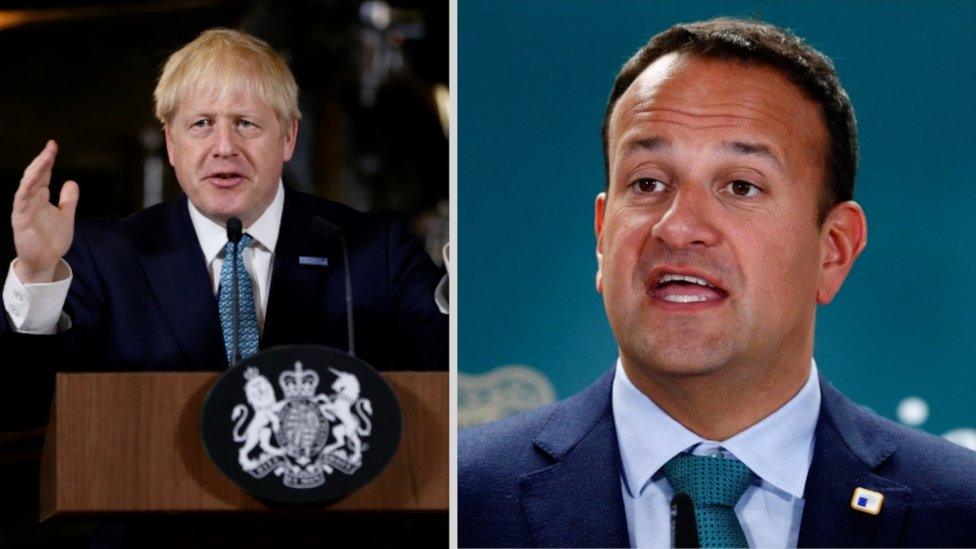Brexit: Dublin scepticism over replacement for backstop
- Published
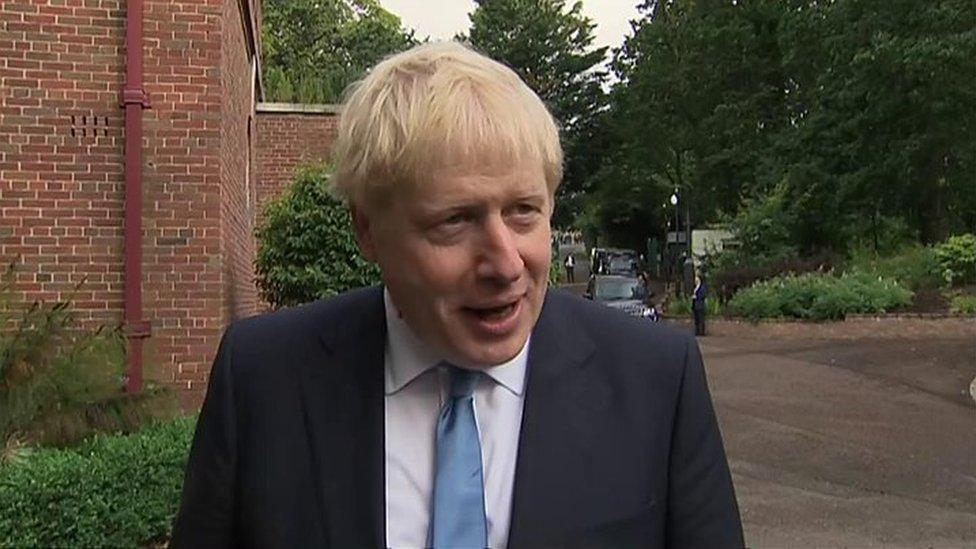
The prime minister is due to attend talks with Leo Varadkar in Dublin on Monday
Boris Johnson is due in Dublin for talks with Taoiseach Leo Varadkar on Monday.
Ahead of that, Mr Varadkar's deputy Simon Coveney gave Downing Street a preview of what the prime minister is likely to hear when Mr Johnson sketches out his ideas for replacing what he derides as the "anti-democratic" Brexit backstop.
In a speech at a conference in Cambridge on Friday night, Mr Coveney reiterated Dublin's view that the UK has yet to come up with a "worked out alternative to the backstop".
The tánaiste remarked that "a promise that something will be found is not the same as finding it".
He expressed scepticism that a viable replacement for the border backstop can be found in time for the UK's scheduled departure from the EU on 31 October.
The Irish deputy prime minister mounted a spirited defence of the backstop, saying it was Brexit, not the efforts to mitigate its impact, which had rocked the foundations of the Good Friday Agreement.
"Brexit is what is causing the challenge here" he declared "it is the disrupter, not the backstop", he said.
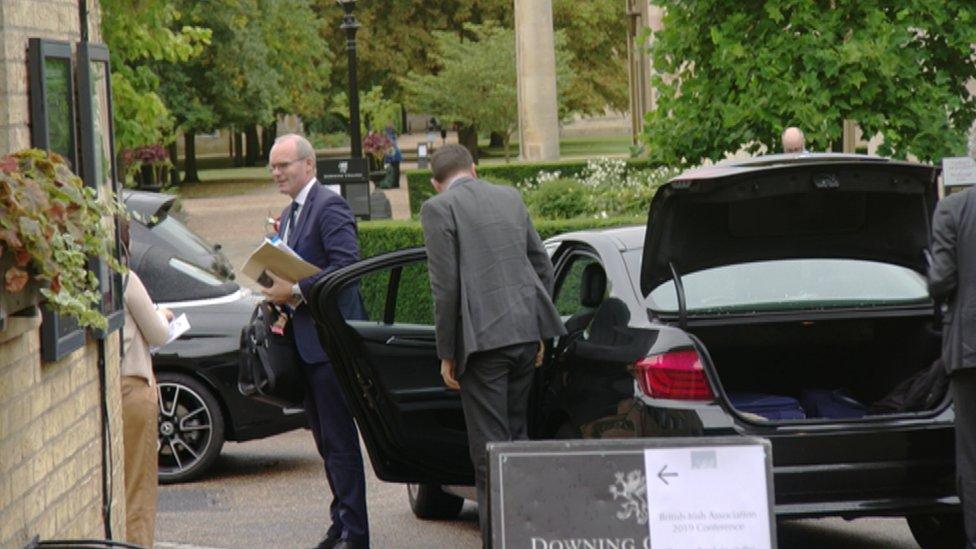
Simon Coveney arriving for Brexit talks in Cambridge
The Ulster Unionist MLA, Steve Aiken, who was in the audience for Mr Coveney's speech, responded over Twitter by accusing the Tanaiste of mouthing platitudes.
Mr Aiken said Mr Coveney "did not make any convincing case… that the Backstop did not undermine the principle of consent" enshrined in the 1998 peace deal.
The British-Irish Association brings together unionists, nationalists, academics and other interested parties on an annual basis, and its conference at Cambridge takes place under what are known as "Chatham House Rules".
They prevent reporters from attributing comments unless, like Mr Coveney's speech or Mr Aiken's tweet, the participant has published them themselves.
Within that constraint, it's fair to say senior British sources are setting great store by the suggestion that the island of Ireland could be treated after Brexit as a single zone for food standards.
They hope what Boris Johnson called "the germ of an idea" , externalcan be worked up to avoid massive disruption to the agri-food sector on both sides of the border and obviate the need for those checks routinely carried out when food or animals are imported into the EU from other countries.
Irish sources gave the plan a polite reception as a step in the right direction.
However, they continue to express doubt about the viability of a regulatory deal which covers food but not other goods.
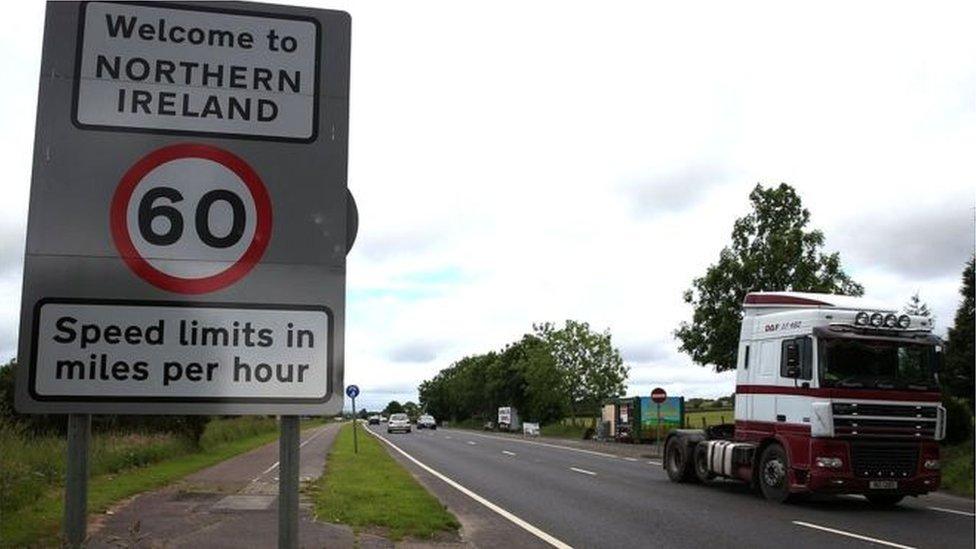
If a truck crosses the border and the driver says he only has bread in his lorry, how do you know unless you take a look?
If you have to check anything, the argument goes, then you have to check everything otherwise you end up with a smuggler's charter.
So even though the single agri-food zone appears to have the DUP's initial support, it still requires a lot of detailed work.
Moreover, Dublin and the EU have political as well as practical reasons for treating Boris Johnson's initiative with extreme caution.
They are well aware of the likelihood of a general election in the coming weeks, so why move now when it's not clear whether Mr Johnson will still be in Downing Street by the end of the year?
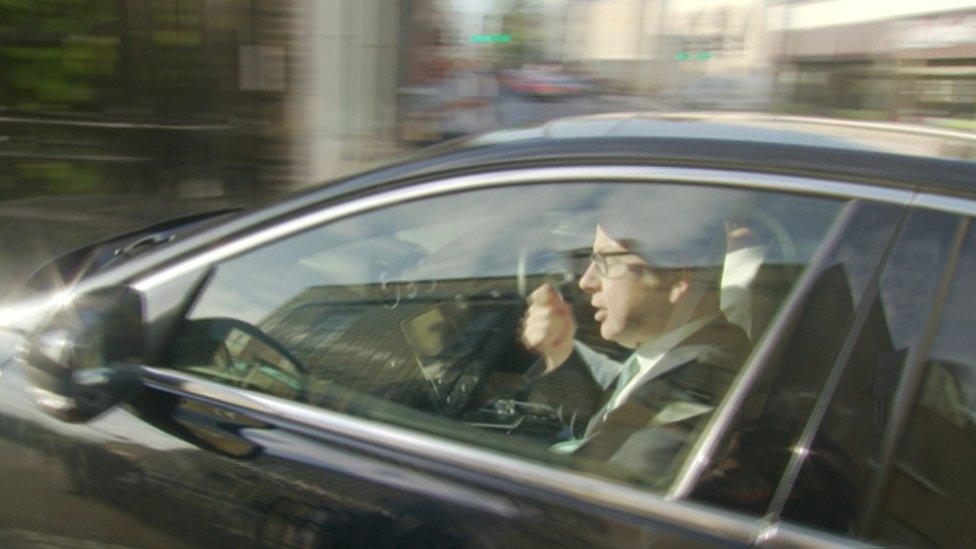
Michael Gove arrives at Brexit conference in Cambridge on Friday
Another talking point at the British-Irish Association conference is the potential return of direct rule from London to enable Northern Ireland officials to cope with a no-deal Brexit.
Michael Gove told a Westminster Committee last week it was "a possibility", while cabinet minutes released in court showed the Northern Ireland Secretary Julian Smith warning the prime minister about the need for "legislation relating to decision-making powers in a no-deal scenario".
Two things are going on here. The extra flexibility which Stormont officials currently enjoy to run their departments without ministers has to be extended before it expires on 21 October.
As I understand it, parliament needs to be sitting for this to happen but, if it is, the extension is pretty automatic.
Beyond that, senior officials take the view a no-deal Brexit will require London ministers to get more involved (although I wouldn't bet on them calling it "direct rule" due to its negative connotation for nationalists).
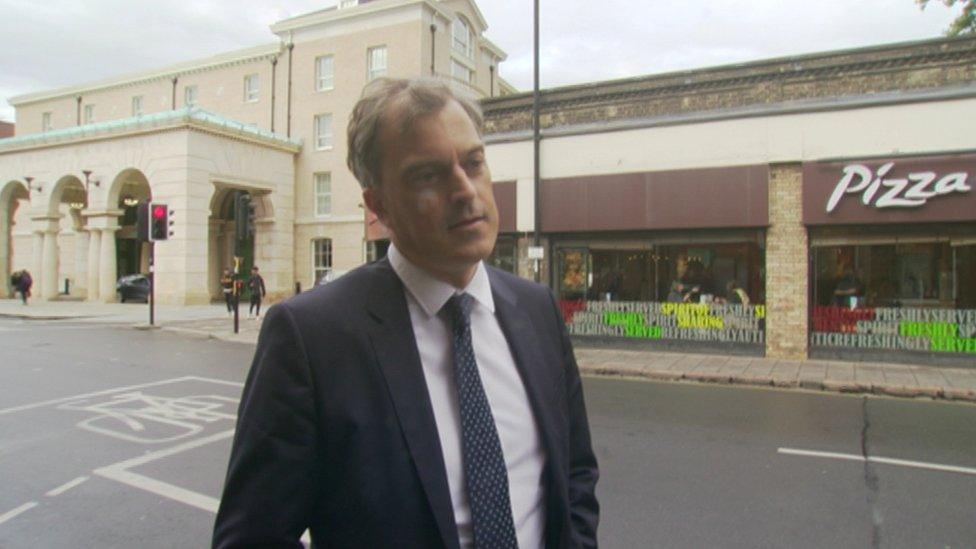
Secretary of State Julian Smith reportedly warned the prime minister about the need for "legislation relating to decision making powers in a no-deal scenario"
For example, Michael Gove has indicated that if Northern Ireland's farmers are badly hit by a no-deal Brexit, significant financial resources would be devoted to compensation.
However, this would be a new programme - rather than an existing Stormont scheme - so devolved officials would have difficulty getting it up and running.
It might not meet standard "value for money" criteria, requiring a politician to give a departmental permanent secretary what is known as a "ministerial direction" to press ahead. Currently, Julian Smith doesn't have that power.
'Stormont stand off'
Even if, despite the suspension of parliament, the NIO does carve out the time (two or three days) needed for primary legislation, there could be tank traps ahead.
The last Northern Ireland Executive Formation bill was initially tightly drawn. But it ended up becoming the vehicle for amendments which are set to introduce same-sex marriage and decriminalise abortion.
In these unpredictable times, could the opposition seize the opportunity of a new Northern Ireland bill to tack on other wider Brexit-related measures intended to further shackle Boris Johnson's minority government?
Given the extraordinary length of time the NIO has spent avoiding any move towards direct rule, the sudden prospect of Westminster politicians assuming more active leadership will undoubtedly ruffle feathers.
Some will see it as a retrograde step, others as a long-overdue provision of basic governance.
Gradually, and then suddenly, the rules of the Stormont stand off might be about to change.
- Published6 September 2019
